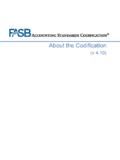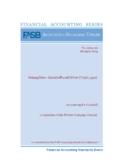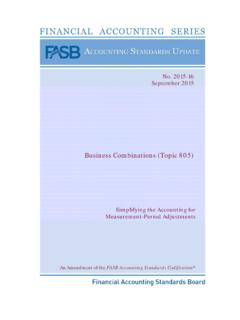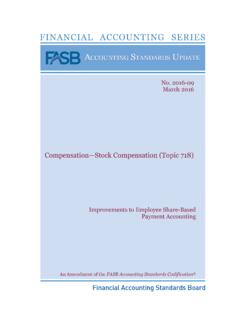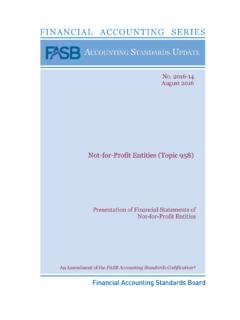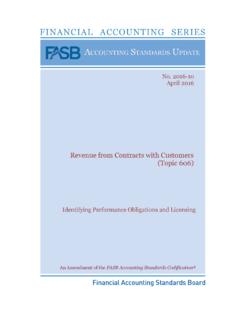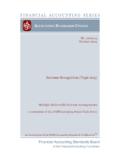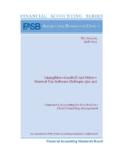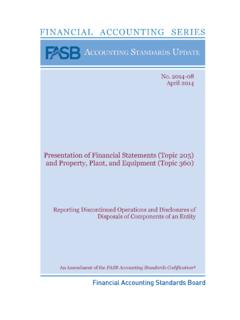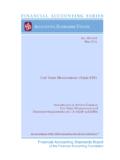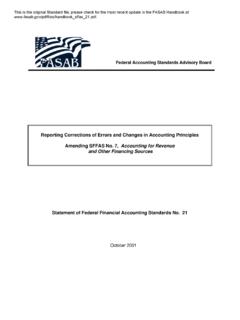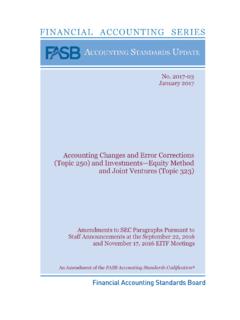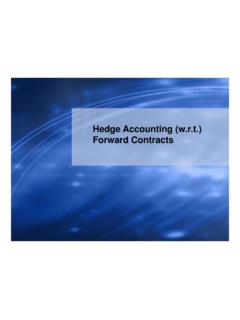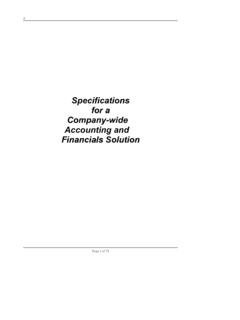Transcription of Income Statement—Reporting Comprehensive Income (Topic …
1 Income Statement Reporting Comprehensive Income (Topic 220) No. 2018-02 February 2018 Reclassification of Certain Tax Effects from Accumulated Other Comprehensive Income An Amendment of the FASB accounting Standards Codification The FASB accounting Standards Codification is the source of authoritative generally accepted accounting principles (GAAP) recognized by the FASB to be applied by nongovernmental entities. An accounting Standards Update is not authoritative; rather, it is a document that communicates how the accounting Standards Codification is being amended.
2 It also provides other information to help a user of GAAP understand how and why GAAP is changing and when the changes will be effective. For additional copies of this accounting Standards Update and information on applicable prices and discount rates contact: Order Department Financial accounting Standards Board 401 Merritt 7 PO Box 5116 Norwalk, CT 06856-5116 Please ask for our Product Code No. ASU2018-02. FINANCIAL accounting SERIES (ISSN 0885-9051) is published monthly with the exception of May, July, and November by the Financial accounting Foundation, 401 Merritt 7, PO Box 5116, Norwalk, CT 06856-5116.
3 Periodicals postage paid at Norwalk, CT and at additional mailing offices. The full subscription rate is $255 per year. POSTMASTER: Send address changes to Financial accounting Series, 401 Merritt 7, PO Box 5116, Norwalk, CT 06856-5116. | No. 461 Copyright 2018 by Financial accounting Foundation. All rights reserved. Content copyrighted by Financial accounting Foundation may not be reproduced, stored in a retrieval system, or transmitted, in any form or by any means, electronic, mechanical, photocopying, recording, or otherwise, without the prior written permission of the Financial accounting Foundation.
4 Financial accounting Foundation claims no copyright in any portion hereof that constitutes a work of the United States Government. An Amendment of the FASB accounting Standards Codification No. 2018-02 February 2018 Income Statement Reporting Comprehensive Income (Topic 220) Reclassification of Certain Tax Effects from Accumulated Other Comprehensive Income accounting Standards Update Financial accounting Standards Board accounting Standards Update 2018-02 Income Statement Reporting Comprehensive Income (Topic 220) Reclassification of Certain Tax Effects from Accumulated Other Comprehensive Income February 2018 CONTENTS Page Numbers Summary.
5 1 2 Amendments to the FASB accounting Standards Codification .. 3 7 Background Information and Basis for Conclusions .. 8 13 Amendments to the XBRL Taxonomy .. 14 1 Summary Why Is the FASB Issuing This accounting Standards Update (Update)? On December 22, 2017, the federal government enacted a tax bill, , An Act to Provide for Reconciliation Pursuant to Titles II and V of the Concurrent Resolution on the Budget for Fiscal Year 2018 (Tax Cuts and Jobs Act). Stakeholders in the banking and insurance industries submitted unsolicited comment letters to the FASB about a narrow-scope financial reporting issue that arose as a consequence of the Tax Cuts and Jobs Act.
6 Specifically, stakeholders expressed concern about the guidance in current generally accepted accounting principles (GAAP) that requires deferred tax liabilities and assets to be adjusted for the effect of a change in tax laws or rates with the effect included in Income from continuing operations in the reporting period that includes the enactment date. That guidance is applicable even in situations in which the related Income tax effects of items in accumulated other Comprehensive Income were originally recognized in other Comprehensive Income (rather than in Income from continuing operations).
7 Those stakeholders asserted that because the adjustment of deferred taxes due to the reduction of the historical corporate Income tax rate to the newly enacted corporate Income tax rate is required to be included in Income from continuing operations, the tax effects of items within accumulated other Comprehensive Income (referred to as stranded tax effects for purposes of this Update) do not reflect the appropriate tax rate. Who Is Affected by the Amendments in This Update?
8 The amendments in this Update affect any entity that is required to apply the provisions of Topic 220, Income Statement Reporting Comprehensive Income , and has items of other Comprehensive Income for which the related tax effects are presented in other Comprehensive Income as required by GAAP. What Are the Main Provisions and Why Are They an Improvement? The amendments in this Update allow a reclassification from accumulated other Comprehensive Income to retained earnings for stranded tax effects resulting from the Tax Cuts and Jobs Act.
9 Consequently, the amendments eliminate the stranded tax effects resulting from the Tax Cuts and Jobs Act and will improve the 2 usefulness of information reported to financial statement users. However, because the amendments only relate to the reclassification of the Income tax effects of the Tax Cuts and Jobs Act, the underlying guidance that requires that the effect of a change in tax laws or rates be included in Income from continuing operations is not affected. The amendments in this Update also require certain disclosures about stranded tax effects.
10 When Will the Amendments Be Effective? The amendments in this Update are effective for all entities for fiscal years beginning after December 15, 2018, and interim periods within those fiscal years. Early adoption of the amendments in this Update is permitted, including adoption in any interim period, (1) for public business entities for reporting periods for which financial statements have not yet been issued and (2) for all other entities for reporting periods for which financial statements have not yet been made available for issuance.
